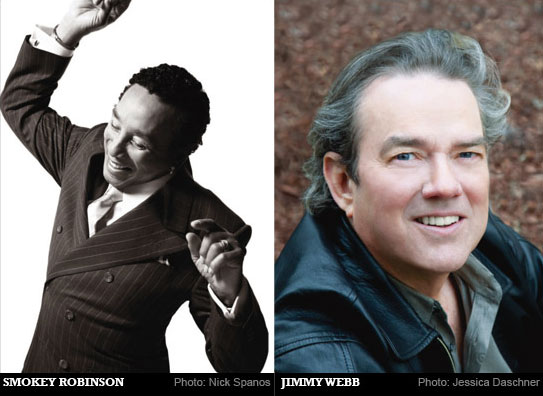
SMOKEY ROBINSON
It all started with a local five-member harmony group called the Matadors. Those five teenagers caught the attention of Berry Gordy Jr., bringing the man who would define the Motown sound to his attention.
Born William Robinson, on February 19, 1940, in Detroit, MI, Robinson started writing songs when he was six, including one for a school play in first grade. That one song started an avalanche that would not stop for decades, leaving behind over 1,000 songwriting credits, dozens of Top 40 hits and many classics penned for Motown’s other big acts, including Mary Wells, Marvin Gaye and the Temptations, among others.
After seeing the young Matadors as they auditioned for Jackie Wilson’s manager, Gordy took an interest in the group, especially their lead singer and songwriter. When the two met, Robinson had a notebook with hundreds of unfinished songs in it, and Gordy taught the budding star how to identify the hits. Gordy soon distributed their song “Got A Job,” an answer to the hit song “Get A Job,” in the Detroit area, and it became a hit.
The success of the group, now called the Miracles, convinced Gordy to start his own record company, Tamla Records, which soon became Motown. The Miracles became one of Motown’s most consistent hitmakers. As a child, Robinson adored Nolan Strong & the Diablos, and emulated Strong’s high tenor. That signature voice crafted a string of hits, which included “Ooh Baby Baby,” “The Tracks of My Tears,” “The Tears of a Clown” and “You’ve Really Got a Hold on Me.” His tender high tones wrapped themselves around moving love ballads with ease, overshadowing their upbeat dance tunes, like “Going to a Go-Go,” “Mickey’s Monkey” and “I Gotta Dance to Keep from Crying.”
Robinson released his first solo album in 1973, Smokey, with the first single dedicated to the Miracles. His successful solo career led to a new genre of slow R&B, named after his hit album, A Quiet Storm. He was inducted into the Rock and Roll Hall of Fame in 1987. In recent years, Robinson grappled with a clingy letter “U” while singing “You’ve Really Got a Hold on Me” on Sesame Street, served as a guest judge on American Idol, performed on Later…with Jools Holland with Eric Clapton, who requested to appear after learning that Robinson would perform, and released a new album, Time Flies When You’re Having Fun, with Joss Stone, Carlos Santana and India.Arie making guest appearances. He is the spokesman for the Great American Smokeout and is one of the few people to be honored twice on the Hollywood Walk of Fame, both on his own and as a member of the Miracles.
JIMMY WEBB
Jimmy Webb overcame his father’s objections to pop music to become one of the most successful songwriters of our time, pushed pop music into new metaphorical territory and found success in an amazing array of genres.
Born August 15, 1946 to an itinerant Baptist preacher, Webb spent his youth travelling through Oklahoma, Texas and California. His mother’s dream was to see him play the organ in the Baptist Church, and by 12, he was accompanying his father’s services.
As a teenager, Webb rearranged the hymns he played for his father, then started writing his own songs. In short order, his mother died, he graduated from high school, and then decided to stay in California to pursue a career as a songwriter. His father gave him $40 and told him, “This songwriting thing is going to break your heart.”
Belying his father’s prediction, Webb is the only artist to receive Grammys for music, lyrics and orchestration. In 1967 alone, he won eight Grammys for two songs, “By The Time I Get To Phoenix” (according to BMI, the third most performed song in the 50 years between 1940 and 1990) and “Up, Up and Away.”
Starting out as a contract writer for Motown, few composers have transcended genre lines as steadily and successfully as Webb. He has written hits for Frank Sinatra (“Didn’t We”), the Brooklyn Bridge (“Worst That Could Happen”), Johnny Rivers (“Do What You Gotta Do”), Art Garfunkel (“All I Know”), Linda Ronstadt (“Easy For You To Say”), Joe Cocker (“The Moon’s A Harsh Mistress”), Harry Nilsson (“Campo de Encino”), Arlo Guthrie (“Oklahoma Nights”), Barbra Streisand (“Little Tin Soldier”), Shawn Colvin (“If These Walls Could Speak”), Waylon Jennings, Willie Nelson, Johnny Cash, and Kris Kristofferson as the Highwaymen (“Highwayman”) and, famously, Richard Harris (“MacArthur Park”), who wasn’t even a singer.
Webb, a member of the Songwriters Hall of Fame and the Nashville Songwriters Hall of Fame, contributes to film and television projects and has penned a best-selling book, Tunesmith: Inside the Art of Songwriting, considered by many, ironically, to be a songwriter’s bible. In 2010, he released Just Across the River, featuring 13 of his best-known songs, all duets between Webb and artists like Glen Campbell, Mark Knopfler, Linda Ronstadt, Lucinda Williams, Jackson Browne, Michael McDonald, Billy Joel, Willie Nelson, J.D. Souther and Vince Gill.
What’s next? Webb says, “For the first time in my life I’m going to write an operetta from the ground up, and I’m interested in putting together a Volume 2 of Across the River. There’s some really interesting people already expressed interest and showing up.” We bet there are.
![]()
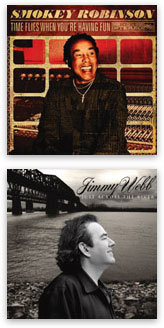 Elmore: What are you listening to right now?
Elmore: What are you listening to right now?
Smokey Robinson: Bach. And my own new CD because I’m adding songs from our live concert. Nat King Cole. And I’m learning Spanish, so I have one of those Rosetta Stones.
Jimmy Webb: Chopin’s first piano concerto. I will be listening to Chris Botti while [my wife] Laura and I get dinner ready.
EM: What was the first record you everbought?
SR: “Baby It’s You.” It was by a group called the Spaniels. I was 11.
JW: “Turn Around, Look at Me” by a young singer named Glen Campbell. I borrowed the money from my father and walked to the record store. I would have been about 13 or 14.
EM: Where do you buy your music?
SR: I usually get it online. Some people just send me records. I get so many of those, man, I’m telling you.
JW: I get my music at iTunes and I also go to specialty collectors’ sites online to get classical recordings that are very difficult to get now. I still get CDs. I like to stick ’em in the slot. I like the whole sensation of dealing with a physical object; it’s still important to me. I think it would be hard for our generation to get over that. I miss vinyl—the smell of it, the size of the album covers, imminently displayable.
EM: What was the first instrument you played?
SR: The piano. I took alto saxophone lessons from the time I was maybe nine until I was about twelve. It did not take.
JW: Piano. My mother put me in piano-lesson prison—I was six years old, and she made me play every day. There was a little chicken timer that measured 30 minutes, click, click, click, click, click, click, and the bell rings. If I didn’t do it, I was in some big trouble. Later, my band instrument was cornet…I was without doubt the worst cornet player in the history of the cornet.
EM: What brought you to the instrument you now play?
SR: We had an old upright piano in the house that my mother played, and I was probably about four when I started banging on it. I’m still banging on it.
JW: Falling in love with the piano came consequentially and in synch with the discovery that young women were fascinated with piano players. As the hormones raged, so did my passion for piano.
EM: Who would you like to write with that you haven’t?
SR: Diane Warren [“Unbreak My Heart”], one of my favorite writers in the world, just incredible. But I’d like to write with anybody.
JW: First of all, I’m not a very good co-writer. I tend to approach it the way I used to approach first dates—in a complete tizzy and in a state of agitation bordering on terror. I’ve always been a loner and always wrote my own words, my own music and regarded the process of writing as a kind of secluded ritual. It’s not that I haven’t done it. I’ve written with Kenny Loggins, with Carly Simon. I could see myself writing a song with James Taylor; I think that would come out nice. I think Carole King and I should write. We should get back into that old Brill Building rhythm. I’d write with Bob [Dylan] in a second, and I think we’d get a nice song out of it. I really need to loosen up and be more viable as a collaborator.
EM: What musician influenced you most?
SR: I grew up in a home and there was always music—Count Basie, Duke Ellington, Cab Calloway, those are the first musicians I remember because I had two older sisters. My mom had Muddy Waters, Little Walter and B.B. King, the Five Blind Boys, and the Mantovani and Chopin, so I had a great scope of music.
JW: For composers, I would say Burt Bacharach was the most influential, a brilliant guy, working in the classical idiom long before anyone else like Lennon and McCartney, before Randy Newman, and he’s still making contributions. The early music was so innovative, with the introduction of classical arrangements within teenage music, in your generation’s Top Ten. The song that comes to mind is “Walk On By.” Those were amazing records, the way they combined the symbolic code of the teenaged love affair with the European orchestral tradition that had been alive for hundreds of years.
EM: What was the song or event that made you realize you wanted to be in music?
SR: I’ve been having musical turning points all my life. When I saw Frankie Lymon and the Teenagers, I was about 11 or 12 and Frankie Lymon was probably only two years older than me. The Broadway Capitol Theater, in Detroit, had all these live stage shows, and the Teenagers were all my age and they were jamming and I realized that it was a possibility.
When I met Berry Gordy, he was a songwriter for my singing idol, Jackie Wilson. We auditioned for Jackie Wilson’s manager, and Berry just happened to be there—this is way before he started Motown. We sang about five songs I had written rather than stuff that was currently popular by other people. They rejected us, but he was impressed by two of my songs and so he came out afterwards. He decided to work with us and become our manager. I said, “Hey man, this could happen!“
JW: I figured that out around 14 or 15 years old, before I was out of high school. We used to have a record come out, and a couple months later there’s a follow-up [a similar song]. They don’t do that anymore, but I used to pay a lot of attention to those follow-ups, and started writing my own. When a real follow-up came out I would be very steely-eyed and I would listen and think, “Mine’s better.” No one heard them; I just played them in the garage, where my father had banished me. When I felt, honestly, that my music was on a par with or better than some of this music, I began to have such a rush of confidence. It demystified the whole thing. It was like, “Hey they’re not doing anything I can’t do.”
When I was 16, I graduated high school, and unfortunately, my mother’s death was a catalyst. I moved to LA and if people asked me what I did for a living, I said “I’m a professional songwriter.” I believed it. You have to believe it. My real home was Motown. I got hired there as a contract writer and one of my very first moneymaking projects was a Christmas song, “My Christmas Tree,” for the Supremes. I made $350 bucks. It was never a threat to “White Christmas.”
EM: Who would you like in your rock ‘n’ roll heaven band?
SR: You know, honey, I can’t even answer that. I am such a musical fan and a musician fan and a singer fan and all that, I would have a 2000 piece band with maybe about 5000 singers.
JW: I would get Jeff Porcaro, Toto’s drummer. I think probably the best bass player, the most innovative and way, way ahead of his time—I have to go with Paul McCartney. Keyboards, the late, great Larry Knechtel, who I played with for years, who I loved as a man…he created the inspired piano accompaniment for “Bridge Over Troubled Water.” A session player who is part of the LA sound, Dean Parks, would be my lead guitar player, and my acoustic guitarist would be Fred Tackett. I brought him to LA. He was playing drums in Honolulu and I said, “Throw these drums away, we’re going to LA.” For vocals, I’d get J. D. Souther, Michael McDonald and Beth Nielsen Chapman—she wrote “This Kiss.”
EM: What’s your desert island CD?
SR: I’ve been buying and hearing music all my life and What’s Going On is my favorite album of all time. Marvin Gaye was my brother, one of my closest friends. While he was composing What’s Going On, he would tell me, “Smoke, this album is being written by God, and I’m just sitting here and God is flowing this stuff through me.” And when I listen to it today, I believe it, because it’s prophecy. It’s more poignant today than when it came out.
JW: I’d probably take Bill Evans’ Sunday at the Village Vanguard. That’s my style of piano playing.


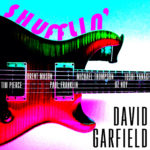
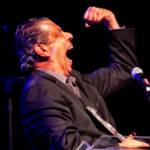
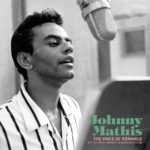
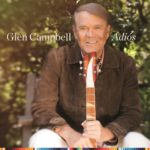

Be the first to comment!